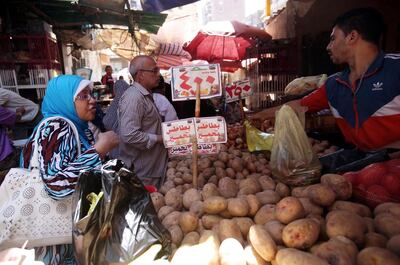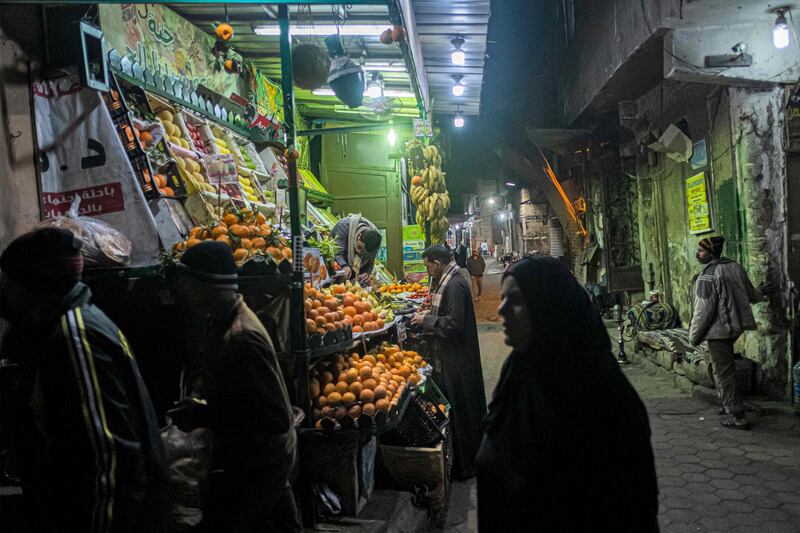From vegetables to dental treatment to phones, more and more Egyptians are resorting to deferred payment methods to meet their needs in a time of record inflation.
Buy now, pay later – or BNPL – has been on the rise in Egypt since last year, when the value of the Egyptian pound dropped by more than half after a series of devaluations. The sector is expected to grow by 52.3 per cent this year, according to a Research and Markets report.
But the trend is not limited to FinTech companies and purchases of big-ticket items by the more affluent classes.
Khaled Alaa, a vegetable seller in Al Asher, a lower-income neighbourhood of the east Cairo district of Nasr City, has begun offering his own BNPL scheme.
Mr Alaa said residents of the area can pay for their fruits and vegetables over the course of a week, but he is selective about which customers he allows to do this.
“Most of my customers are women who live in or around the area. So I know where they live and if they don’t come and pay their debts, there is a direct way for me to reach them. So those are mostly the people I accept,” he tells The National.
Food prices helped to drive Egypt’s headline inflation to another record in August, up to 37.4 per cent from 36.5 per cent the previous month.
With the cost of essentials rising, people have been deferring or reducing spending in other areas.
Mohamed Hamed, a dentist in Greater Cairo’s Giza district, said he began to offer patients deferred payments in March after noticing a months-long decline in visits and a growing reluctance to undergo more expensive procedures.
“Towards the end of last year, I began receiving patients who needed fillings or root canals but they couldn’t afford them,” Dr Hamed said.
“When they would hear the high prices, they would just ask me to remove the whole tooth and get it over with, which is a cheaper procedure."
A filling that cost 200 pounds last year now costs more than 700, he said.
“I decided to first allow customers I knew well or who lived in my area to break up their payments into instalments. I wasn’t sure how safe it was to do the same for people I don’t trust. But a few months ago, I began to ask for a copy of patients’ national IDs and for them to sign a proof of debt.”
The new business model “has worked well for now, as more patients have begun to return”, he said.
Over the past year, FinTech companies such as ValU and Sympl have also increased their operations significantly to meet the demands of wealthier Egyptians, whose purchasing power has also been diminished by record inflation.
ValU, owned by EFG Hermes, partners with local businesses to offer zero-interest payment plans on a wide range of products and services.
While the company had long provided payment plans for items such as clothes and beauty products, over the past year, its offerings have expanded to include tuition fees for some of Cairo’s more expensive universities, pharmacy bills and doctors’ fees.
“A large part of the rise in the popularity of companies like ValU is the inflation level, that part is undeniable,” said Ali Al Idreesy, a financial analyst.
“A rise in inflation diminishes purchasing power which in turn could severely damage the economy of a country like Egypt, because it is a mostly consumptive country that doesn’t produce as much so purchasing is how it all keeps going and we are seeing this being facilitated on a lot of levels.
“People are now not able to afford even necessities and if there is an option they can use to do that, they will use it, it only makes sense.”

The country’s largest financial institutions, including the Central Bank of Egypt, have moved to open more BNPL options. The central bank has adjusted the requirements for credit card applicants to allow them to borrow a larger percentage of their income than before.
Mr Al Idreesy said this to give more people more spending ability and keep the economy moving.
Noran Momen, a filmmaker from an affluent background and a user of BNPL services, said deferred payments “have been a lifesaver”.
While such schemes have allowed the poor to afford necessities, they also allow wealthy Egyptians “to remain inside their desired social class”, she told The National.
“Something like an iPhone, for instance, has become so expensive that very few people I know can buy it for cash upfront. However, accepting a reality where you now can’t afford an iPhone after being able to for years makes people panic that the prices are pushing them out of their upper social class,” she added.
“So you use these services and continue being a part of your socioeconomic group.”
The rise in BNPL services in Egypt is also due to increasing financial awareness among Egyptians, Mr Al Idreesy said.
Thanks to the rise in social media use and advertising campaigns by FinTech companies, people are now more aware of the financing options open to them.
“These mechanisms have gone so far beyond covering necessities. They are now creating markets themselves by promoting the ease of their purchasing mechanisms,” he said.
“I think one of its most positive aspects is that it’s making Egyptians more financially savvy.”







